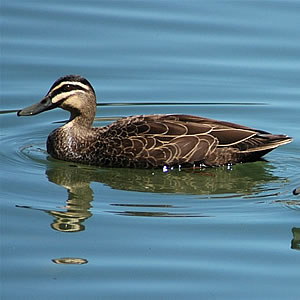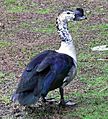Dabbling ducks facts for kids
Quick facts for kids Dabbling ducksTemporal range: late Miocene to present
|
|
|---|---|
 |
|
| Pacific black duck (Anas superciliosa) | |
| Scientific classification | |
| Kingdom: | |
| Class: | |
| Order: | |
| Family: | |
| Subfamily: |
Anatinae
|
Dabbling ducks are a special group of birds. They are part of the larger Anatidae family. This family also includes swans and geese. Dabbling ducks get their name from how they find food. They mostly feed by "dabbling" at the water's surface. This means they tip their bodies forward. They don't usually dive deep underwater.
Contents
What Are Dabbling Ducks?
The group of birds called Anatinae are known as dabbling ducks. They are a sub-family of the Anatidae family. This family includes all ducks, geese, and swans.
Dabbling ducks are different from diving ducks. They find their food mainly on the surface of the water. They also feed in shallow water. They often tip their bodies upside down. Their tails point up in the air. This lets them reach plants and insects just below the surface.
How Dabbling Ducks Eat
Dabbling ducks have special beaks. These beaks help them filter food from the water. They use small comb-like structures on the edges of their beaks. These structures are called lamellae. They help strain out small plants, seeds, and insects.
They often feed in wet grasslands or shallow ponds. They also eat seeds and grains from fields. You can often see them in parks and lakes.
Where Dabbling Ducks Live
Dabbling ducks live all over the world. They can be found on every continent except Antarctica. They prefer freshwater habitats. These include ponds, lakes, rivers, and marshes. Some species can also live in coastal areas.
Many dabbling ducks migrate. This means they fly long distances. They move between their breeding grounds and warmer wintering areas. They travel in large groups called flocks.
Types of Dabbling Ducks
There are many different kinds of dabbling ducks. Some of the most well-known include:
- Mallards (Anas platyrhynchos): These are very common ducks. Males have a shiny green head.
- Northern shovelers (Spatula clypeata): They have a very large, spoon-shaped bill. This bill helps them filter food.
- Teals (Anas crecca): These are smaller ducks. They are known for their fast flight.
- Wigeons (Mareca penelope): They often eat grass and other plants on land.
Extinct Relatives
The dabbling duck family also includes some extinct birds. One interesting group was the moa-nalos. These were large, flightless ducks. They lived on the Hawaiian Islands. They became extinct a long time ago. This happened after humans arrived on the islands.
Gallery of Dabbling Ducks
-
Baikal teal (Sibirionetta formosa)
-
Indian spot-billed duck (Anas poecilorhyncha) in Hyderabad, India
-
Philippine duck (Anas luzonica)
-
Mallard (Anas platyrhynchos) (female)
-
Mallard (Anas platyrhynchos) with 6 ducklings
-
Knob-billed duck (Sarkidiornis melanotos): a misplaced dabbling duck?
See also
 In Spanish: Anátinos para niños
In Spanish: Anátinos para niños
 | Kyle Baker |
 | Joseph Yoakum |
 | Laura Wheeler Waring |
 | Henry Ossawa Tanner |








